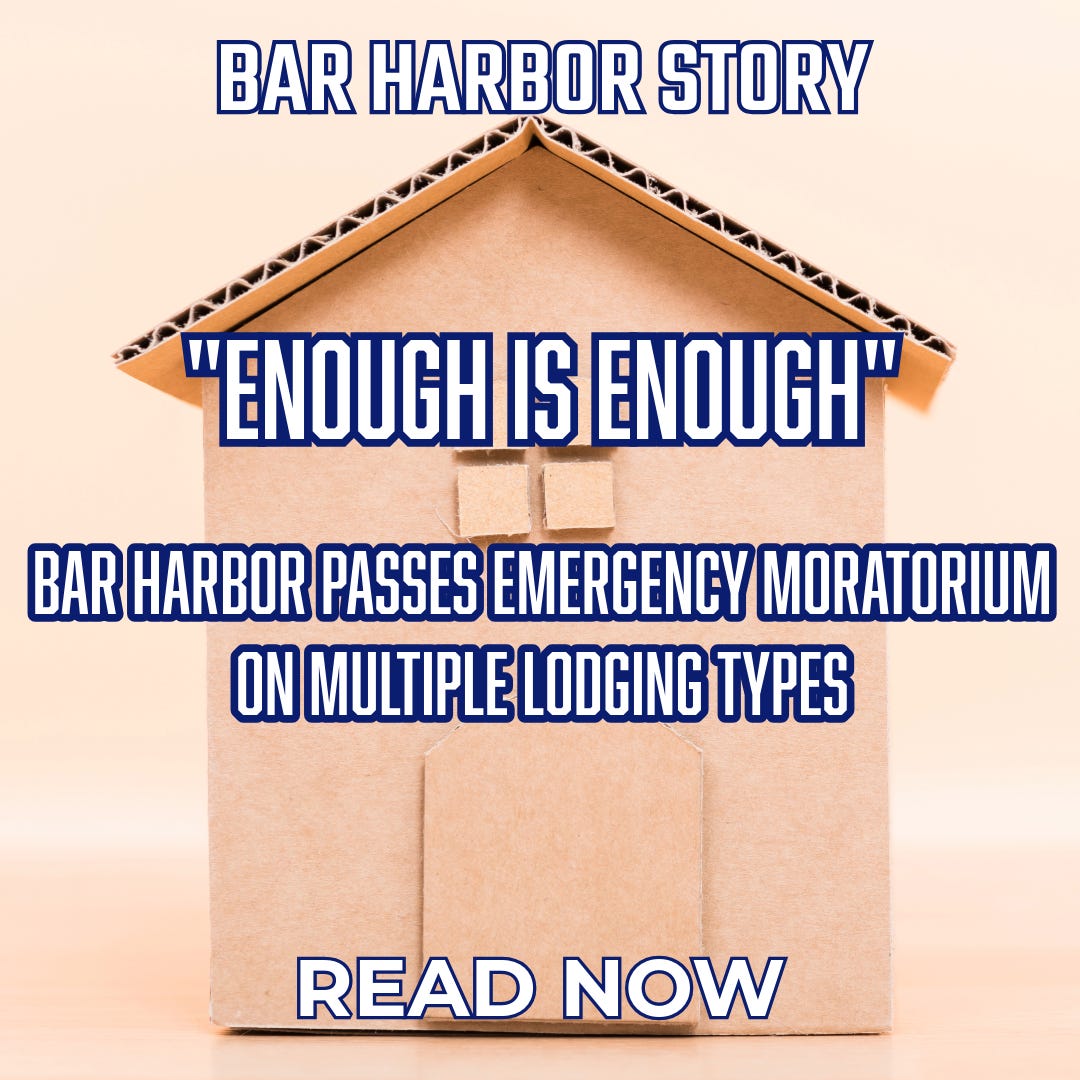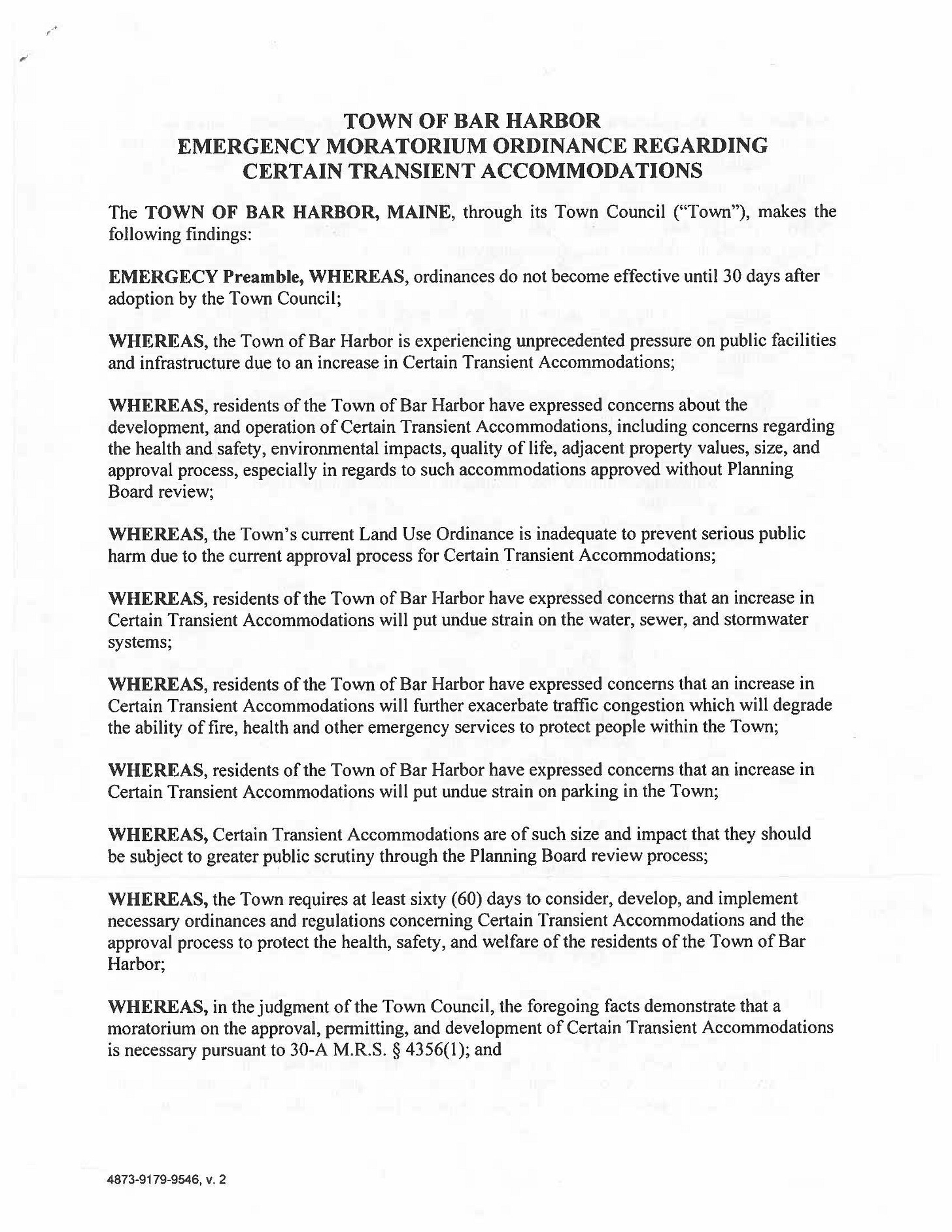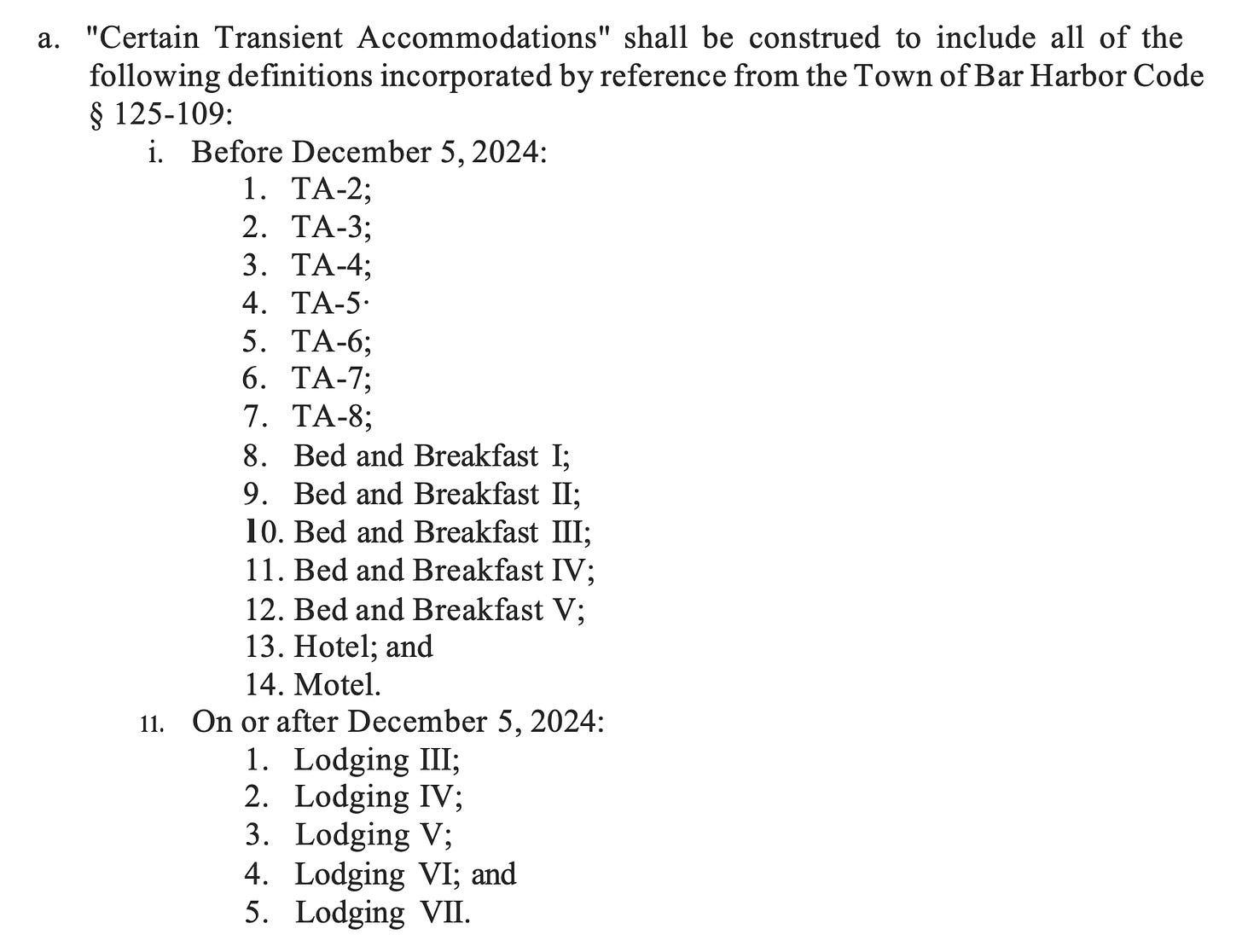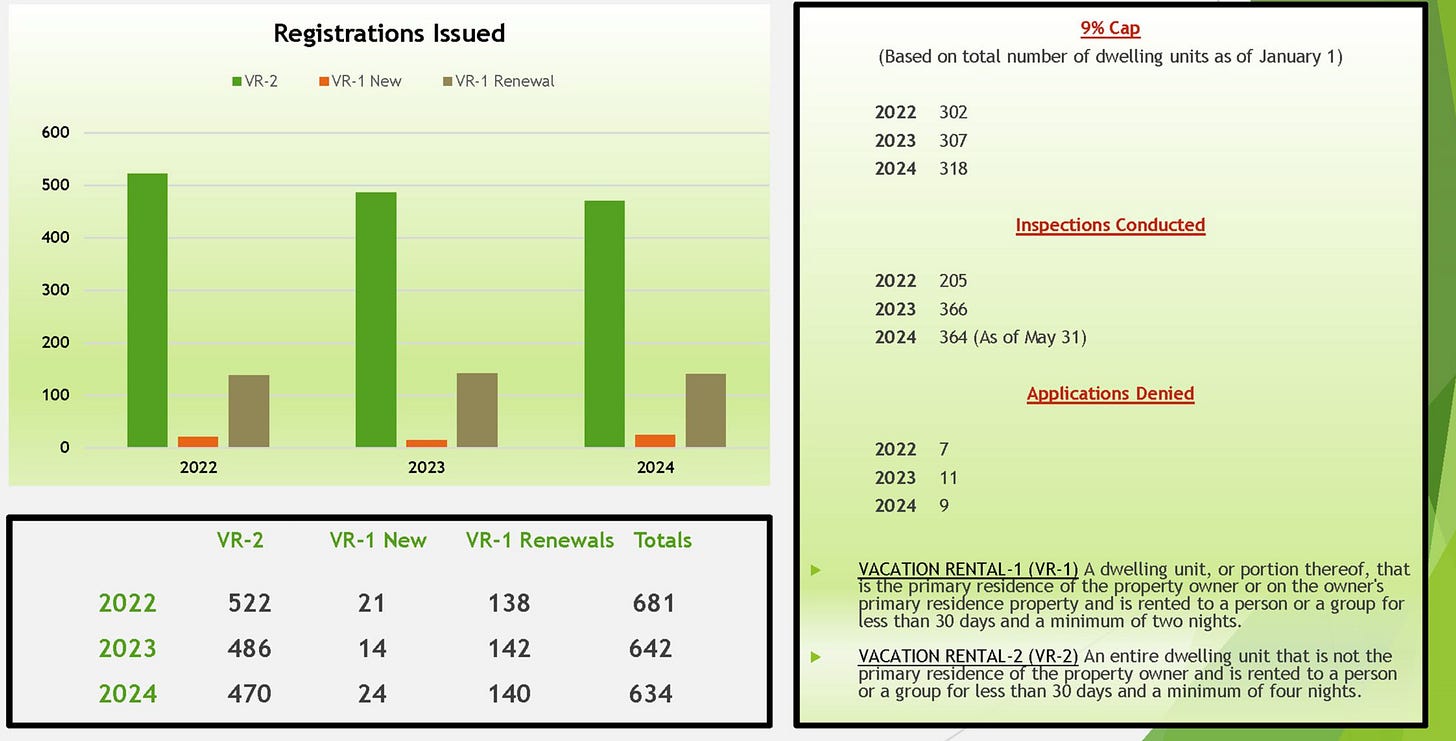"Enough is Enough"
Bar Harbor Passes Emergency Moratorium on Multiple Lodging Types
The Bar Harbor Story is generously sponsored by Window Panes Home and Garden.
BAR HARBOR—The third time was the charm for supporters of a lodging moratorium in Bar Harbor, Tuesday night. This most recent effort, brought forward by Town Council Vice Chair and newly elected State Representative Gary Friedmann focuses on larger lodging types and will last 60 days with an option for the councilors to then enter a regular moratorium with refinements or not. It is in effect for the entire town.
The measure passed 6-1 after the council returned from an extended recess so that attorney Johnathan Hunter from Rudman Winchell and town staff could draft the resolution, refining the proposed moratorium that had been included in the council packet last Friday.
The original proposal had included owner-occupied vacation rentals, but that was dropped in favor of the councilors working to refine loopholes in that registration process without using a moratorium.
“The council’s trying to use a scalpel tonight and not a sledgehammer,” Town Manager James Smith said.
Because it is an emergency ordinance, the moratorium can be adopted at the same meeting as it was proposed. It will be in place for 60 days. Non-emergency moratoriums can be in place for 180 days.
It includes an emergency preamble, which states,
“WHEREAS, the Town of Bar Harbor is experiencing unprecedented pressure on public facilities and infrastructure due to an increase in Certain Transient Accommodations;
“WHEREAS, residents of the Town of Bar Harbor have expressed concerns about the development, and operation of certain transient accommodations, including concerns regarding the health and safety, environmental impacts, quality of life, adjacent property values, size, and approval process, especially in regards to such accommodations approved without Planning Board review;”
It goes on to say that Bar Harbor’s “Land Use Ordinance is inadequate to prevent serious public harm due to the current approval process,” and that people are concerned that the “increase in certain transient accommodations will put undue strain on the water, sewer, and stormwater systems” as well as increased traffic congestion.
The purpose is also within the moratorium and is “to allow municipal officials reasonable time to evaluate the concerns raised in regards to anticipated or proposed development of Certain Transient Accommodations, to determine the adequacy of existing land use ordinances and regulations, the approval and permitting process of Certain Transient Accommodations, and, if necessary, develop additional ordinances and regulations to provide adequate protection for the property, health, welfare, land use, compatibility, environmental compatibility, and protection of all residents and visitors in the Town of Bar Harbor, such as but not limited to sewer, water, storm water, and parking.”
The types of lodgings (transient accommodations) included is defined per the effective date of new changes to lodging definitions, December 5. Those definition changes were approved by voters at the November election and come into effect 30 days after the election. This created a bit of discussion about how the 60-day moratorium would cover the differing terms.
It covers TA 2-8, bed and breakfast I-V, hotels, and motels. After December 5, it covers roughly those same categories now called lodging three through seven.
The moratorium is effective November 19 and applies to anything incomplete and currently in process. An emergency moratorium has to be adopted by a majority of the council plus one, which is five.
At one point, it seemed as if the moratorium would not gather the necessary votes.
Chair Valerie Peacock initially said she wasn’t sure how she was going to vote. She said that there is a temperature among the town that there is too much lodging and that to fix that and change the process requires work that is “big and hard and complicated and will take a lot of time.” She didn’t feel like the moratorium was long enough to bring about change and worried about villifying people in the transient accommodations industry.
There’s no doubt, Peacock said, that there a divided space in Bar Harbor that didn’t begin and doesn’t only exist around lodging.
“Whether you agree or not, we’re all here to try to make Bar Harbor a better place,” Peacock said.
“This is the chance to do the work,” Councilor Joe Minutolo said and warned that taking no action would likely create another citizens’ initiative, such as the one in 2022 that created the cruise limit caps that are currently in federal litigation.
Councilors Earl Brechlin, Maya Caines, Matthew Hochman, Peacock, Friedmann, and Minutolo voted in favor.
Councilor Kyle Shank voted against expressing concerns about the logic of the inclusion of one of the lodging types. Earlier he said that he had an uphill climb to get to a yes vote because of the policy objective.
Hochman had been worried that there was no data to support it being an emergency.
There are an estimated 3,000-3,500 rooms for visitors in Bar Harbor, not counting campgrounds and vacation rentals.
”During the grand hotel era we had block-sized hotels,” Hochman said that could hold 6,000 rooms. “I’m struggling a little bit that this actually meets the legal definition of emergency.” Later in the meeting, a resident said that how people arrived to the island (ferry, train, horse) during that era as well as differing historical norms of water usage had different implications for the town’s congestion and infrastructure.
“I think it’s hard to compare yesteryear to today,” Minutolo said. “This is to give us a chance to breathe.” He later added, “This is not punishment. This is about looking toward the future.”
The ordinance can be renewed as is or tweaked after 60 days. It can also end then or be repealed. If the Council had not enacted the emergency ordinance November 19, the soonest a moratorium could have been enacted was December.
BUILD UP TO THE MORATORIUM
Back in September 2023, the town’s attorney Steven Wagner explained that a moratorium is “essentially a pause on development.” To do that, the councilors would have to make certain findings: that the moratorium is necessary to stop a burden on public facilities and other aspects; that the existing comprehensive plan is inadequate to do so. At the time, it was not passed or tabled, but sent to staff.
Six weeks ago there had been a town council meeting and a workshop on the comprehensive plan, Friedmann said. The moratorium discussion came up them.
“We all know that our town has been experiencing unprecedented growth,” Friedmann said with visitors to Acadia National Park overrunning the town.
The question becomes, he said: Where should hotels and motels be, and what requirements need to be included in those new buildings? Should there be more parking? Should there be employee housing requirements?
“We have a number of applications in the hopper,” Friedmann said. “If we don’t act now, we’re going to lose the opportunity,” to shape the future of our town and to determine what we want this town to look like. A certain amount of growth and change is good, he said, but it came to a head with cruise ships. “It’s actually not just cruise ships. They’re 5% of our visitors.”
The cruise ships, he said, were obvious examples of how the town was being overrun. He referenced the League of Town meeting in October which focused on regional housing and transportation issues and referenced the number of visits to Acadia National Park. Bar Harbor is the focus of visits for many travellers.
“A place where we live should be a place where we start to say ‘enough is enough,’” Friedmann said.
“I absolutely agree with everything you said, Gary,” Caines said.
VR-1 DISCUSSION
Caines added that she wants to be mindful of individuals who are renting out rooms in their homes to survive here, which is the VR-1 category that was initially included in the moratorium.
“I don’t know why VR-1s are included in this,” Shank said, adding that the moratorium’s timeline could confuse the yearly permitting timeline for owner-occupied vacation rentals.
“It’s come to council attention that there are property owners in town who are perverting the ordinance,” Friedmann said.
According to Friedmann some property owners are giving one-percent ownership on a deed and calling it a residence so that they can apply as VR-1s, which is not capped.
“It’s very easy to get a VR-1 right now in this town. This has happened more than once,” he said before asking if the council can act quickly enough to create changes to the registration process. Smith said that they could. The planning department has already been working on some changes to registration requirements.
Peacock said VR-1s are a really important part of the Bar Harbor community and how people can piece together a living here.
“A majority of people are doing this legally,” she said, and it’s been part of the culture and history of the town.
MORATORIUM DISCUSSION AND PUBLIC COMMENT
During the councilors’ discussion Minutolo stressed, “Bar Harbor’s not going to die because we put a moratorium on.”
Brechlin said that the town needs time to let its comprehensive plan be approved by voters and take root as well as for sustainability efforts to get off the ground. He worried about the possibility of an entire block being purchased and changed into a hotel.
“Our job is to talk to the community and give the community the tools to get what we want,” Brechlin said, rather than have the community served on a platter by others.
Caines expressed her concerns about the town’s infrastructure. “We have a responsibility as a council to look forward to what we want to be.”
“We’ve got to protect our residential areas,” Minutolo said.
During public comment, Stewart Brecher said, “This is not unique. Almost every wonderful place in the world is being overrun by tourists who have no real interest in improving the quality of life” for the people who live here.
A moratorium, he said, only has a point if you have an answer at the end of it. “It’s really a monoculture,” he said of Bar Harbor’s tourism economy, and monocultures eventually die. “We cannot tax the people who are eating up our community.”
He wished that the state would allow local taxes to help support towns such as Bar Harbor’s infrastructure needs. Currently, sales taxes brought in by heavily touristed areas such as Bar Harbor go into the state’s coffers and then are dispersed throughout the state.
Bo Jennings appealed to both facts and feelings and said, “Feelings matter. Your feeling does matter.” He also spoke to how there are fewer vacation rentals since the town capped non-owner occupied ones (VR-2) and how three hotel rooms are needed to cover approximately the same number of visitors housed in a VR-2
One man who works a front desk at a local hotel spoke to the diminishing quality of vacationers’ experiences when the park is crowded with hikers and parked cars and it might not be easy to get into a restaurant. Diane Vreeland said that the situation was definitely an emergency.
Sharon Knopp said that the residents accept that they live in a tourist town. She loves that the town wakes up in the spring and goes to sleep in the fall, but she is worried about children’s safety on streets or hotels near places where kids congregate. She also worried about water capacity. Eagle Lake, she said, is the lowest she’s ever seen it. She also spoke to traffic congestion.
“It’s just become too much,” she said.
Hotelier Stephen Coston said, “We’ve reached peak absurdity.”
Coston mentioned the $232,000 payroll he just made to his employees who rely on jobs in his inns and hotels. “Do you not care about these people? Do you not care?”
Coston’s proposed inn on Eden Street would abut the Conners-Emerson School and has caused concern among some residents and the school board about its location. He said that Kids’ Corner, a local education provider for children not yet in grade school, is near multiple hotels and employee living quarters and “nobody’s said a word.”
He also questioned the lack of negative response when nonprofits such as College of the Atlantic and Jackson Laboratories expand.
“Twenty-five rooms is not going to make a difference,” he said.
“I understand that there’s a lot of emotions, but we don’t have to be like this,” Peacock said. Earlier in the meeting she had asked that people not vilify each other or call out certain projects during the discussion.
Cara Ryan said that the lack of housing makes it difficult for service providers to live and work on the island. “I think we already have a problem.”
Ellen Grover said that she thinks the town has failed to manage tourism.
“Are we a community or are we a tourist trap?” she asked.
“We’re seeing stuff being built in this community faster than we can see what the repercussions are,” Tyson Starling said as audience member after audience member expressed their support for a moratorium.
Tom St.Germain said that he believes a moratorium “would help developers in Ellsworth and the surrounding communities.”
He said it would hurt middle class and lower income people on the island, who would have less opportunities and that it would increase congestion by day trippers who would go to hotels in the surrounding areas and come onto the island to enjoy the park or communities.
St.Germain called for a commitment to a sustainable management plan that didn’t hurt the community.
Sarah O’Connell said that she is as invested as it gets in the topic having opened Explore Acadia Cottages this May.
“This is my passion,” she said, but now she “kind of feels ashamed of it.” She wants to be part of the solution.
“I’ve never agreed with so many people who disagreed with each other,” Peter Miano said.
Enoch Albert said the town needs a breather and he was concerned about infrastructure.
“We’re going down this road with blinders on and we’re not looking at the whole picture,” he said.
LINKS TO LEARN MORE
A NOTE FROM US
Hello!
This is Carrie and Shaun, and as you’ve probably noticed, we’ve been working hard at the Bar Harbor Story, providing local news in a way that keeps you informed, but also embraces and promotes community and the good that is within it.
We take so much time—just the two of us, with a special needs kid that has to be homeschooled—to cover our island community’s (plus, Trenton) local news in a way that’s timely, daily, and remembers that underneath the news . . . there are people who are our neighbors.
We are working hard to get the news out there—for free—for everyone. But it’s taking its toll on our family financially and honestly, sometimes, emotionally, because frontline local news in a small community? It’s hard.
Most media isn’t local (even when it claims it is). Most media has paywalls and advertisers. We don’t. That’s not a smart financial decision for us. It’s a moral one. And we’re going to try to do it for as long as we can because we’re local, we’re passionate, and we’re all about getting the news to everyone—no paywalls.
Richard Stengel, writing in The Atlantic, said, "Paywalls create a two-tiered system: credible, fact-based information for people who are willing to pay for it, and murkier, less-reliable information for everyone else. Simply put, paywalls get in the way of informing the public, which is the mission of journalism.”
As a paper that is owned and staffed by locals, we make every attempt to gather all of the facts for our readers, information that might not be part of the main story and/or information that may not be known even to our towns’ officials, but is still just as important, if not more important, to the story.
We currently have over 3,000 subscribers, the vast majority of them free, with over 230,000 article reads every month. Every one of our stories is opened at least 2,000 times. Most are opened well over that amount.
To continue to provide you with fact based, non-editorialized news, we really need your support! If you’d like to support us or subscribe? It would mean the world to us, and to the Bar Harbor Story!
There are a few ways to do that:
You can send us a one-time support via this link here. It will say “Carrie Jones Books” because that’s what our PayPal account is through.
Your business or nonprofit can sponsor the Bar Harbor Story with a banner ad. More information on that is here.
THANK YOU FOR SUPPORTING OUR COMMITMENT TO ALL OF OUR COMMUNITY
If you’d like to donate to help support us, you can, but no pressure! Just click here.
If you’d like to sponsor the Bar Harbor Story, you can! Learn more here.












Thank goodness this passed! As for the negative comments from developers -- Coston can still pay his employees with his existing businesses and St.Germain (and Coston) has the freedom to go into Ellsworth and surrounding areas and develop them. Nothing is stopping them in those areas. The middle class is already getting hit. I can't afford my land taxes now.... much of it goes to support the Bar Harbor infrastructure that developers reap the benefits from. I do not.
Thank BSJ and commenters for Excellent coverage of this moratorium development. Many of us see that the way for a strong and positive community for all members is to have balance: neither an all tourism economy or a no tourism economy would be good for Bar Harbor. Some tourism balanced by year round businesses and nonprofits with an emphasis on affordable housing for year round residents , not just seasonal lodging for tourism employees will keep Bar Harbor
A thriving town.
Steven Coston and Tom St. Germain can currently build all the legally permitted structured summer tourism businesses they wish to do .
What residents are objecting to is where and how many hotels are going that are particularly noxious to those impacted. Coston and St. Germain are not forced to build anything. They could listen to their neighbors, instead of their me, me, me, all for Me mentality. It really boils down to being a thoughtful member of a community for all citizens, not just a few corporate developers out for their bottom lines.